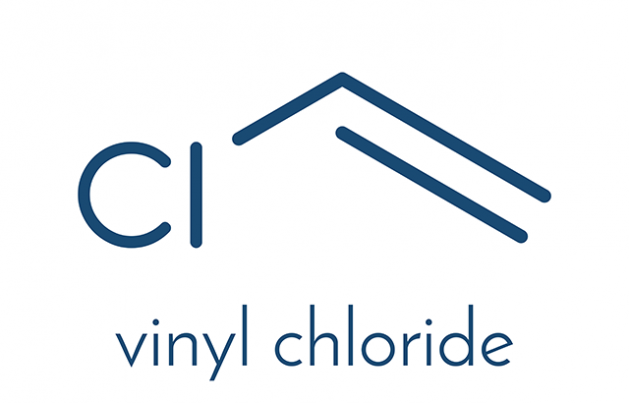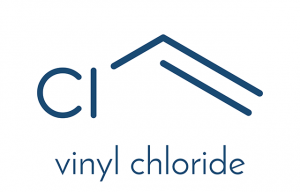
Vinyl chloride — toxicity, side effects, diseases and environmental impacts
Tuesday, November 14, 2017 by Michelle Simmons
http://www.naturalpedia.com/vinyl-chloride-toxicity-side-effects-diseases-and-environmental-impacts.html

Vinyl chloride is a colorless gas with a mildly sweet smell that easily burns. It is not a naturally-occurring substance and must be manufactured industrially for its commercial purposes. Vinyl chloride can be formed when other substances such as trichloroethane and trichloroethylene are broken down. It is mainly used in making polyvinyl chloride (PVC), which is used to make different products made of plastic, such as pipes, wire and cable coatings, and packaging materials. The chemical is also used as a combustion product in tobacco smoke.
Other names for vinyl chloride include: Chloroethene; Chloroethylene; Ethylene monochloride; Monochloroethene; Monochloroethylene; VC; and Vinyl chloride monomer (VCM).
List of known side effects
Vinyl chloride has been found to cause a lot of side effects on humans. One of these is its carcinogenic effect on humans. Studies have shown that it can cause or increase the risk of a rare form of liver cancer known as angiosarcoma. It also increases the risk of other forms of cancers such as brain and lung cancers, lymphoma, and leukemia. Short-term exposure to the chemical also caused side effect on the central nervous system (CNS), causing dizziness, drowsiness, headaches, and giddiness. It has also been found to cause slight irritation in the eyes and respiratory tract in humans. Short-term extreme exposure to the chemical resulted to loss of consciousness, lung and kidney irritation, and inhibition of blood clotting in humans, and cardiac arrhythmia in animals.
Chronic inhalation and oral exposure to the chemical causes liver damage. High levels of vinyl chloride in the air also lead to blanching of fingers, numbness, discomfort, changes in the bones at the end of the fingers, joint and muscle pain, and scleroderma-like skin changes such as thickening of the skin, decreased elasticity, and slight edema. Long-term exposure also causes visual and/or hearing disturbances, fatigue, memory loss, and sleep disturbances. In addition, it leads to peripheral neuropathy, tingling, numbness, weakness, and pain in fingers. Some studies have shown that vinyl chloride causes reproductive and developmental side effects, such as decreased male sexual performance, testicular damage, decreased male fertility, birth defects, and miscarriages.
Environmental side effect of vinyl chloride include air pollution, particularly in areas near factories that make vinyl products, and water supply contamination as vinyl chloride can enter the household air when the water is used for showering, cooking, or laundry.
Body systems affected by vinyl chloride
One of the body systems that vinyl chloride can negatively affect is the integumentary system as it may cause skin irritation and skin corrosion. Moreover, it affects the cardiovascular and immune systems, liver, and development of organs.
Items that can contain vinyl chloride
According to SaferChemicals.org, vinyl chloride can be found in a wide variety of products such as pipes, wire and cable coatings, packaging materials, upholstery for vehicles and furniture, wall and floor coverings, flooring, backing for carpet, house wares, automotive parts, medical devices, and children’s toys.
How to avoid vinyl chloride
For people who are working with vinyl chloride, there are several ways to avoid the chemical. One of these is to wear personal protective equipment, such as protective gloves and clothing, made from material which cannot be permeated or degraded by this substance to avoid skin contact. To avoid eye contamination, it is a must to wear non-vented, impact resistant goggles when working with fumes, gases, or vapors, or to wear a face shield along with goggles. To avoid inhalation of the chemical, there should be a proper ventilation in the workplace. It is also a must to wear respirators, but not chemical cartridge or canister respirators. Since tobacco smoke also contains vinyl chloride, limiting or avoiding exposure to cigarette or cigar smoke is a way to avoid it.
Where to learn more
- Speaking about the real causes of autism…
- Influence Of Industrial Carcinogens On Human Body
- Toxic BPA Used in Two-Thirds of Food Packaging, Says New Report
- Liver toxicity: Natural remedies revealed
- Cancer ISN’T all in your genes: Up to 90% of cases ‘could be wiped out by avoiding triggers caused by our unhealthy lifestyles’
Summary
Vinyl chloride is a colorless gas with a mildly sweet smell that is flammable. It is used to make PVC, which is an ingredient in making plastic products, such as pipes, wire and cable coatings, and packaging materials.
Vinyl chloride causes angiosarcoma, brain and lung cancers, lymphoma, and leukemia.
Vinyl chloride causes dizziness, drowsiness, headaches, and giddiness.
Vinyl chloride causes visual and/or hearing disturbances, fatigue, memory loss, and sleep disturbances.
Vinyl chloride causes peripheral neuropathy, tingling, numbness, weakness, and pain in fingers.
Vinyl chloride causes irritations in the skin, eyes, and respiratory tract.
Vinyl chloride affects the nervous, cardiovascular, immune, and reproductive systems.
Sources include:
Tagged Under: Tags: Vinyl chloride






